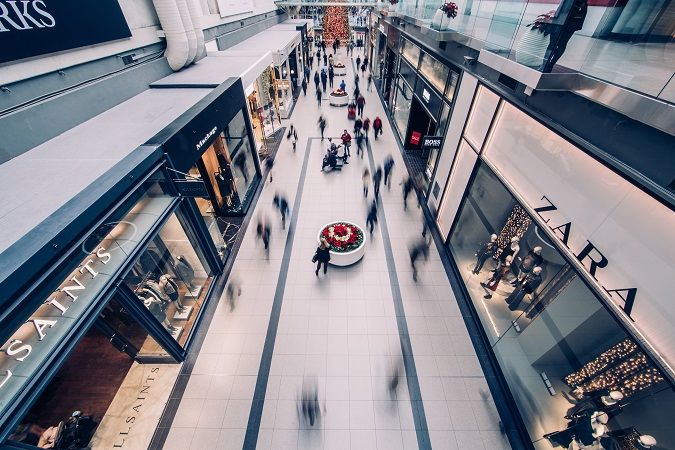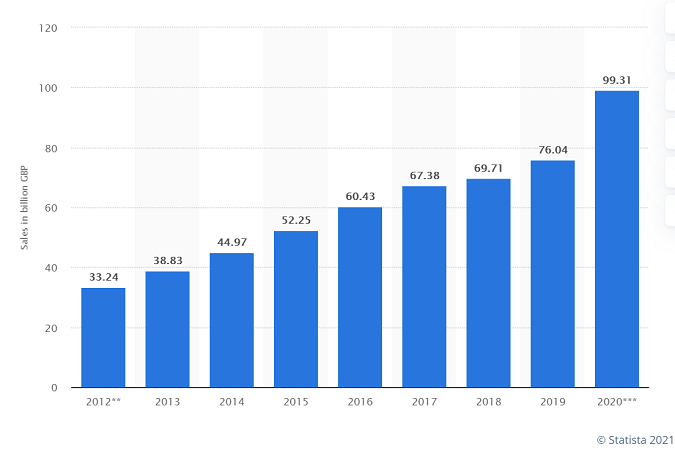Will the most walked path be the online high-street in 2021?
Covid-19 and lockdowns in particular have affected how the UK is shopping, predominately a surge in online shopping. Once lockdown is lifted, will we be itching to get back to the high-street or will online shopping continue to rise in popularity?

Like most people, I am still gripped by COVID-19; physically, I am working from home, seeing the same four walls every day and in total probably walking about 9,500 steps less than I normally would. But mentally, it is a different story; apart from the mental toll isolation takes, I find myself preparing myself before I read the news each morning. What could possibly happen next? I often think back to January 2020 when Australia was tackling catastrophic bushfires, thinking this was the worst start to a year (‘how can it get worse?’) …they do say hindsight is 20 20.
The impact on the retail industry has interested me in particular; going from my lunchtime browse in H&M and Costa, to a lunchtime of reading a book at home and drinking home-brewed tea, at first my spending reduced significantly. It was almost as if I had forgotten about online shopping, although I hadn’t really partaken in that much as being home for delivery was always an issue. Locked down and with nothing better to do, out came the laptop and my credit card. I bought an embroidery kit, a paint-by-numbers and then realising I have a limited creative attention span, I invested in a Nintendo Switch. Yes, I of course relived my childhood and played Animal Crossing!
When the first lockdown was lifted however, whilst my friends were enjoying a visit into town, I didn’t really return to the shops - apart for my eagerly anticipated takeaway coffee! I’m not sure if it's due to not wanting to be in large crowds or because I realised how easy and stress-free online shopping was. Regardless, my online shopping continued. Much to my partners dismay, I would buy things literally at the click of the button, and our recycling bin was getting very full very quickly (the topic of an unnecessary amount of Amazon packaging is for another story!).
The reason I write this, is because the return of the high-street is a much discussed topic. Throughout the first lockdown, it seemed the nation was ready to shop again, with Primark being top discussion - not having an online presence affected both the store and its customers; headlines were likening it to torture!
When June came, footfall trends were not as expected, with the British Retail Consortium and Shoppertrak indicating that footfall was down 63% on last year, and only 19% above May 2020.
However, the Geolytix Retail Recovery Index (RRI) on analysing a geographic trend, found that some places such as Swanage, Ross on Wye and Boroughbridge have bounced back to 70%+ levels of activity.

According to Helen Dickinson OBE, Chief Executive, British Retail Consortium, we didn’t have anything to worry about; “with lockdown measures easing, consumers are slowly re-emerging onto their high streets, shopping centres and retail parks”.
But, the second lockdown came and then the third, and it seemed the British publics’ attempt to return to the high-street was stopped in its tracks. In June funnily enough, we wrote a blog on the rise of click-and-collect (C+C); rising in popularity through necessity (grocery shopping is something we can’t avoid, but we can avoid the store crowds and patiently wait in the carpark for our pre-bought shopping), more and more stores began to offer direct C+C. During the second lockdown, I was surprised by how busy my local shopping centre was, with people queuing for their C+C at Dunelm, Pandora and Bodyshop. This certainly surprised me as C+C was hailed the answer to delivery woes as you don’t need to wait in for your parcel; in a lockdown, we’re all at home!
With the turn of the new year, it seemed online had won. After Arcadia went into administration in November, by January 2021 Topshops’ flagship Oxford Street store was put up for sale. Soon after, Debenhams followed suit, also shutting its flagship Oxford Street store.
While High-street presence took a back step, online sales sky-rocketed; in June DPD announced they were creating 6,000 new jobs to keep up with online demand. Seasalt reported a 17% increase in sales year-on-year after online sales in 2020 increased by 95%. Burberry have announced that whilst their in-store sales suffered, their online sales rose in the golden quarter, driven by a younger client base. And Hotel Chocolat, who previously featured in our blog for having a “sure but steady international expansion”, hasn’t slowed down, reporting a 19% increase in total group revenue claiming their “strong online growth more than compensated” for store closures in lockdown.

It could very easily be that for some businesses, their time to close has come and the Covid-19 pandemic resulting in national lockdowns has merely accelerated this unfortunate inevitability. However, many businesses are reporting that online sales have soared, keeping them afloat when their physical stores were forced to shut.
Is this the end of the high-street?
Well, I don't think so. Now in the third lockdown, whilst I enjoy the ease of browsing on my laptop and ordering to my door, I miss shopping. I miss making an afternoon of it, browsing the stores, trying clothes on, smelling candles before I commit, and browsing shelf upon shelf of books. I miss the social aspect, meeting up with friends or my mum and shopping together, grabbing a bite to eat along the way. Karen Sheppard, Managing Director of People First Mobility agrees that online shopping doesn't provide the interaction and the experience we so crave.
I believe 2020 was the year we 'walked' the online high-street from the safety and comfort of our homes, leaving the physical high-street boarded up. But come 2021 and the easing of restrictions, back to the high-street we go.
Kate McGoldrick, Communications Officer at Geolytix
